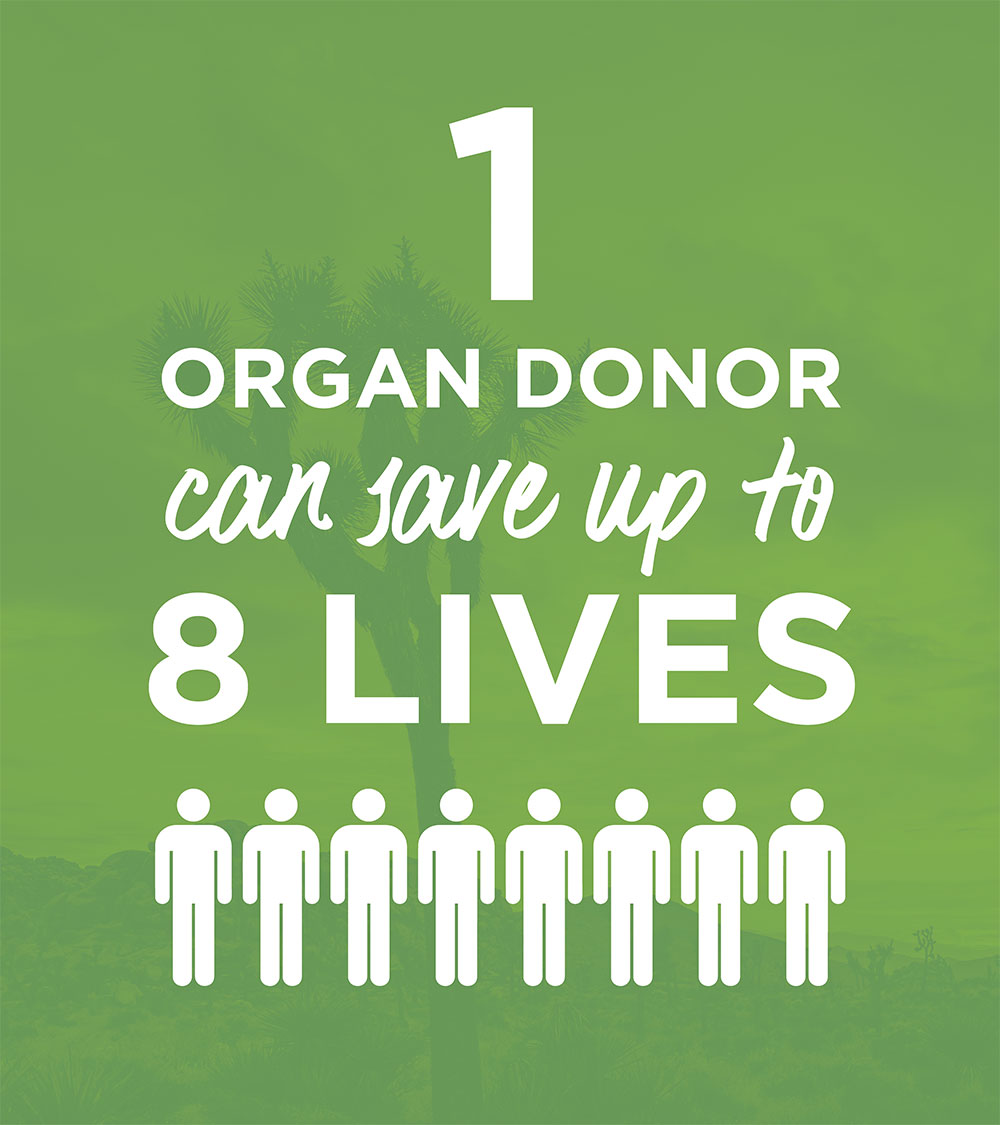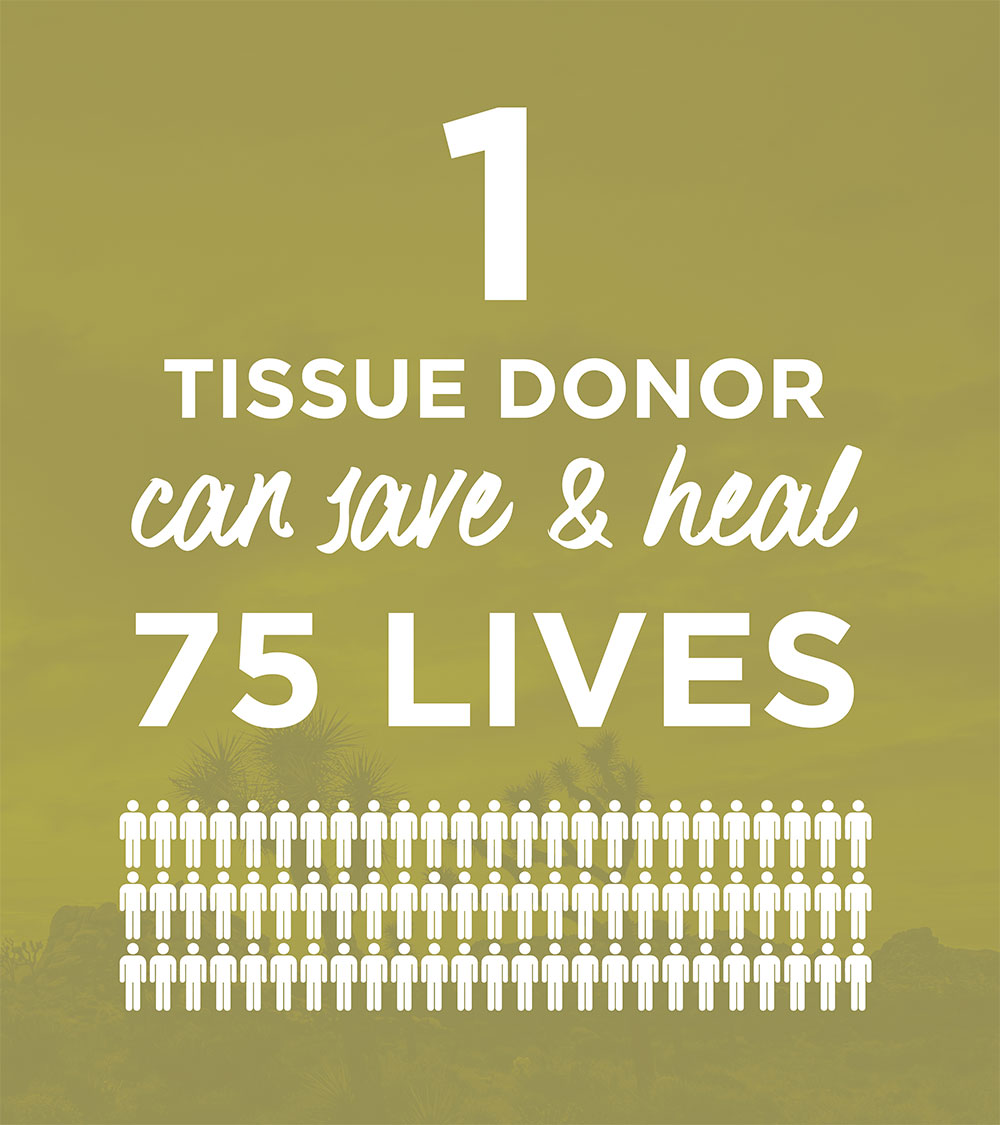What can be donated?
Organs
![]()
Heart
Lungs
Kidneys
Pancreas
Liver
Intestines
Ocular
![]()
Cornea
Sclera
Whole globe
Tissues
![]()
Blood Vessels
Bone & Connective Tissue
Heart Valves
Pericardium
Skin
What Can Be Donated?
Organ
Uses
Benefits
Liver
Chronic hepatitis with cirrhosis
Primary biliary cirrhosis
Biliary atresia
Sclerosing cholangitis
A transplant can allow patients to live a normal, fully functioning life after transplant.
Heart
Severe coronary artery disease
Congenital heart disease
Dilated cardiomyopathy
Many heart transplant recipients lead long and productive lives after transplant.
Lungs
Chronic obstructive pulmonary disease
Idiopathic pulmonary fibrosis
Cystic fibrosis
Idiopathic pulmonary arterial
Hypertension
After a lung transplant, the majority of recipients have no limitations on physical activity.
Kidneys
Chronic kidney disease
High blood pressure
Diabetes
Kidney transplant eliminates the need for dialysis treatments and more.
Pancreas
Type 1 Diabetes with end-stage renal disease
A pancreas transplant can cure diabetes and eliminate the need for insulin injections after transplant.
Intestines
Life-threatening complications from total parenteral nutrition (TPN)
Intestinal transplant recipients are able to transition to an oral diet and resume normal activities of daily living after transplant.
Tissue
Uses
Benefits
Pericardium
Pericardium
Repair defects caused by trauma
Neurosurgery
Promote healing
Enhance life
Blood Vessels
Saphenous vein
Femoral vein
CABG procedures
Peripheral vascular disease
AV access
Restore circulation
Skin
Skin
Burns
Abdominal wall injuries
Reconstructive surgery after mastectomy
Promote healing
Prevent fluid loss
Decrease infection & pain
Bone / Connective Tissue
Femur
Tibia
Fibula
Humerus
Radius
Ulna
Hemi-Pelvis
Fascia lata
Tendons & ligamennts
Trauma
Fractures
Tumors
Degenerative bone disease
Dental surgery
Bladder sling procedures
Hernia repair
Sports injuries
Promote healing
Restore mobility
Prevent amputation
Eyes
Cornea
Sclera
Whole globe
Cornea perforation
Pseudophakic bullous keratopathy
Keratoconus
Corneal degeneration
Corneal scarring due to keratitis & trauma
Restore sight
Heart Valves
Aortic valve
Pulmonary valve
Congenital heart disease
Valvular heart disease
No rejection
No anticoagulation therapy needed
Treatment of choice for children
Low risk of infection


The Donation Process
Tap each step to read more about the donation process:
1. Referral
![]()
1. Referral
The donation process begins with a decision. By registering as a heroic donor, we are deciding to save and heal lives. Potential organ donor referrals come from hospitals. Potential tissue donor referrals come from hospitals, medical examiners, funeral homes and law enforcement agencies. Once Nevada Donor Network receives a referral, we begin the medical evaluation process.
2. Evaluation
![]()
2. Evaluation
Nevada Donor Network reviews preliminary information to determine potential donor eligibility.
3. Authorization
![]()
3. Authorization
Nevada Donor Network will check the registry to confirm whether or night an individual is registered. If they might be registered in another state, we will contact the organ procurement organization (OPO) for that state to check their registry.
4. Family Discussion
![]()
4. Family Discussion
If the patient is registered, Nevada Donor Network will talk with legal next of kin to ensure they are aware of their loved one’s wishes, explain the process, answer any questions and provide emotional support. If the patient is not registered, our team will offer the opportunity of donation to the family as required by law. Once authorization is complete, our team will carefully and compassionately walk the family through next steps.
5. Donor Care
![]()
5. Donor Care
In order to determine which organs and tissues may be suitable for transplant, Nevada Donor Network (NDN) will need to complete a detailed medical and social history with assistance from the potential donor hero’s legal next of kin. Once death is declared, NDN assumes care of the heroic donor. Our team conducts tests and maintains organ function with fluids and medications to ensure they remain viable for transplant. Test results are submitted to the United Network for Organ Sharing (UNOS) in order to generate a list of potential recipient matches.
6. Find a Recipient
![]()
6. Find a Recipient
Nevada Donor Network receives a list of potential matching recipients from the United Network of Organ Sharing (UNOS). The list uses a unique patient ID number to maintain confidentiality of potential recipients. One by one, our team contacts transplant centers for the potential recipients on the list. The recipient’s surgeon has the opportunity to ask questions and then accept or deny the organ. This process continues until all organs are placed.
When it comes to tissue donors, we partner with several tissue banks who work with doctors around the world to share our heroic tissue donor's gifts of healing. Our in-house eye bank helps with giving the gift of sight to those desperately waiting around the world.
7. Recovery
![]()
7. Recovery
Once organs have been matched with recipients, Nevada Donor Network works with our hospital partners to reserve an operating room. Our team facilitates the recovery and transportation details with organ transplant teams locally and from out of town. Organ recovery is a surgical procedure and heroic donors are treated with the utmost care and respect. If tissue is being donated, recovery must take place within 24 hours of a person’s death. Recovered tissues are then sent to a tissue processor who will prepare these healing gifts for transplant. Our team facilitates transportation to the family’s chosen funeral provider for planned arrangements.
8. Family Support
![]()
8. Family Support
Several weeks after donation, courageous loved ones receive a letter from Nevada Donor Network (NDN) with brief outcome information about their loved one’s donation. We offer details about various opportunities to honor their loved one, write to recipients and attend a Donor Remembrance Ceremony. NDN proudly provides ongoing support to courageous families after donation through our Aftercare Program.
Frequently Asked Questions
Q. If first responders/medical professionals know I’m a registered donor, will they still work as hard to save me?
A. Your life always comes first. If you are sick or injured, the first responders’, doctors’ and nurses’ first priority is always to save your life. Donation is only considered after all life-saving efforts have been exhausted.
Q. Can I donate if I’m older and/or have medical issues?
A. Everyone should consider themselves a potential donor, regardless of age or medical conditions. Each patient is evaluated at the time of death to determine which organs and tissues may be medically suitable for donation.
Q. Will my family have to pay for the medical costs if I am a donor?
A. Your family will never have to pay for costs associated with organ, eye and tissue donation. Costs related to donation are paid by the recipient, usually through insurance, Medicare or Medicaid.
Q. If I donate, will I still be able to have an open casket funeral?
A. Throughout the donation process, heroic donors are treated with the utmost respect and dignity. Organs and tissues are recovered in a surgical procedure and all incisions are closed and dressed. Every effort is made to minimize changes to physical appearance.
Q. How do I know if my religion supports organ, eye and tissue donation?
A. All major organized religions in the U.S. support or encourage organ, eye and tissue donation and view it as a final act of charity or love. Learn more about your religion’s position on donation here.
Q. Do I need to tell my family I registered?
A. Even if you are a registered donor, it is important to share those wishes with your loved ones. Your family may be asked to complete paperwork in order for donation to occur.


